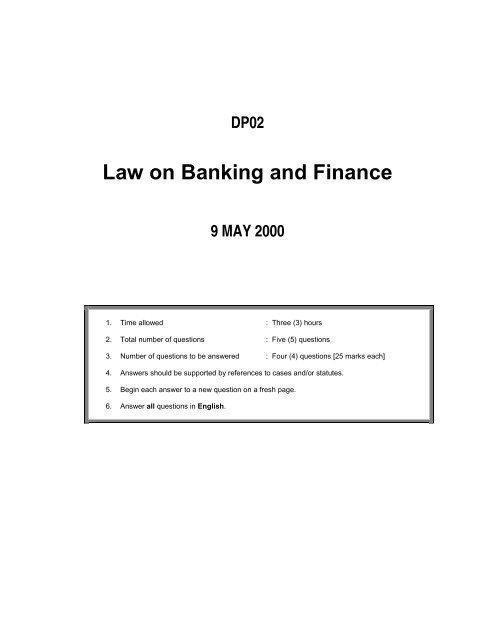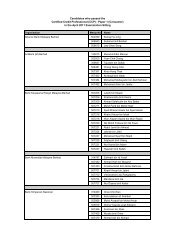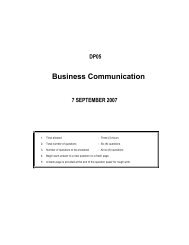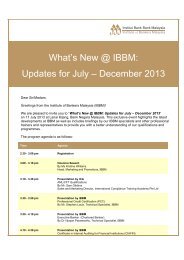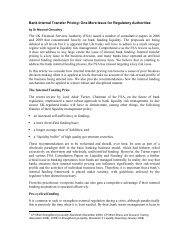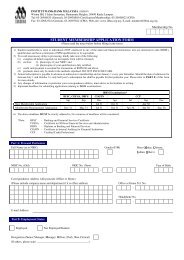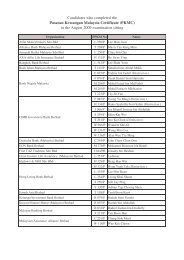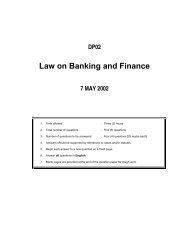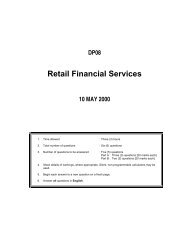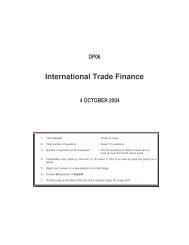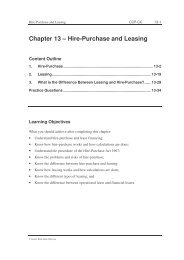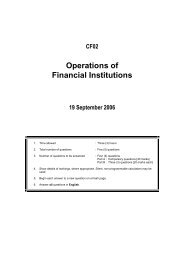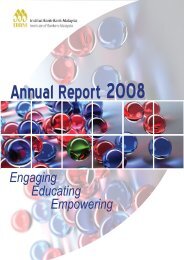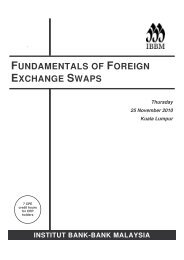Law on Banking and Finance - Institute of Bankers Malaysia
Law on Banking and Finance - Institute of Bankers Malaysia
Law on Banking and Finance - Institute of Bankers Malaysia
Create successful ePaper yourself
Turn your PDF publications into a flip-book with our unique Google optimized e-Paper software.
DP02<br />
<str<strong>on</strong>g>Law</str<strong>on</strong>g> <strong>on</strong> <strong>Banking</strong> <strong>and</strong> <strong>Finance</strong><br />
9 MAY 2000<br />
1. Time allowed : Three (3) hours<br />
2. Total number <strong>of</strong> questi<strong>on</strong>s : Five (5) questi<strong>on</strong>s<br />
3. Number <strong>of</strong> questi<strong>on</strong>s to be answered : Four (4) questi<strong>on</strong>s [25 marks each]<br />
4. Answers should be supported by references to cases <strong>and</strong>/or statutes.<br />
5. Begin each answer to a new questi<strong>on</strong> <strong>on</strong> a fresh page.<br />
6. Answer all questi<strong>on</strong>s in English.
ANSWER FOUR (4) QUESTIONS ONLY<br />
1. (a) Describe what an Islamic bank is <strong>and</strong> state whether the provisi<strong>on</strong>s <strong>of</strong> the <strong>Banking</strong> <strong>and</strong> Financial<br />
Instituti<strong>on</strong>s Act 1989 apply to Islamic banks. [5]<br />
(b)<br />
Mary Foo has recently attended a training programme c<strong>on</strong>ducted by Bank Sedia Bhd. During<br />
the programme, Mary Foo was trained <strong>on</strong> how excellent customer service could be provided to<br />
customers.<br />
Assuming that you are Mary Foo’s supervisor, advise her, by citing reas<strong>on</strong>s for your answers,<br />
whether the following are Bank Sedia Bhd’s customers:<br />
(i)<br />
(ii)<br />
(iii)<br />
Harris, who does not maintain any account with Bank Sedia Bhd, presented a “cash”<br />
cheque for encashment over the bank’s counter. [2]<br />
Mr Ken D<strong>on</strong>ald, who does not maintain any account with Bank Sedia Bhd, purchased<br />
foreign currencies from the bank. [2]<br />
Kewangan Kekal Bhd, a finance company, regularly deposited cheques for collecti<strong>on</strong><br />
or clearing with Bank Sedia Bhd. [2]<br />
(c)<br />
(d)<br />
From the st<strong>and</strong> point <strong>of</strong> the legal positi<strong>on</strong> or requirements relating to or expected <strong>of</strong> a bank,<br />
give any two reas<strong>on</strong>s to explain why it is important for a bank to be able to ascertain whether<br />
any pers<strong>on</strong> dealing with the bank is or is not a customer <strong>of</strong> the bank. [4]<br />
Samy is a current account customer <strong>of</strong> Bank AB Bhd. Samy is angry with Bank AB Bhd as he<br />
claimed that the bank had wr<strong>on</strong>gfully returned his RM300 cheque with the reas<strong>on</strong> “account<br />
closed” when there was a credit balance <strong>of</strong> RM350 in his account.<br />
Bank AB Bhd alleged that Samy’s account was closed based <strong>on</strong> his teleph<strong>on</strong>e c<strong>on</strong>versati<strong>on</strong><br />
with the manager <strong>of</strong> the bank, instructing him to do the same. A cashier’s order for RM350<br />
made in Samy’s favour was posted to him recently. Samy denied having had such<br />
c<strong>on</strong>versati<strong>on</strong> with the manager <strong>of</strong> Bank AB Bhd.<br />
Samy threatens to sue Bank AB Bhd. Advise Bank AB Bhd as to their liabilities, if any. [10]<br />
(Total:25 marks)<br />
2. (a) Mr Wai, Mr Yu, Mr Tee <strong>and</strong> Ms Poo Mee are partners in a legal firm, M/s Wai, Yu, Tee, Poo<br />
Mee & Co. The legal firm is now claiming against Bank IDK Bhd as c<strong>on</strong>structive trustee <strong>of</strong><br />
m<strong>on</strong>ies misappropriated by two <strong>of</strong> their partners (Mr Tee <strong>and</strong> Ms Poo Mee) from the legal<br />
firm’s clients’ account. The two partners had used the misappropriated funds for speculati<strong>on</strong> in<br />
the stock market <strong>and</strong> gambling.<br />
The legal firm alleged that the branch manager <strong>of</strong> Bank IDK Bhd had reas<strong>on</strong>able grounds to<br />
suspect that the clients’ account was operated fraudulently as there were numerous “cash”<br />
cheques drawn <strong>on</strong> that account encashed by Mr Tee <strong>and</strong> Ms Poo Mee themselves. The legal<br />
firm alleged that the branch manager <strong>of</strong> Bank IDK Bhd had never informed the other partners<br />
<strong>of</strong> the legal firm nor did he make any inquiries into the proprietary <strong>of</strong> the cash withdrawals. Mr<br />
Tee <strong>and</strong> Ms Poo Mee have since absc<strong>on</strong>ded.<br />
Advise Bank IDK Bhd <strong>on</strong> their liability, if any, as c<strong>on</strong>structive trustee. [10]<br />
(b)<br />
One <strong>of</strong> the duties <strong>of</strong> the paying banker is to h<strong>on</strong>our its customer’s payment orders or<br />
instructi<strong>on</strong>s. However, under certain circumstances, the paying banker is entitled to refuse<br />
making such payments.<br />
State <strong>and</strong> explain three <strong>of</strong> the instances (citing examples) when a paying banker can refuse to<br />
obey its customer’s payment orders or instructi<strong>on</strong>s. [15]<br />
(Total:25 marks)<br />
2 <strong>of</strong> 9 DBFS May 2000 – DP02 Institut Bank-Bank <strong>Malaysia</strong>
3. (a) In relati<strong>on</strong> to company law, explain the rule in Turqu<strong>and</strong>’s case. [10]<br />
(b)<br />
Mr X makes a cheque deposit into his current account maintained in Bank BC Bhd. The<br />
cheque deposited was drawn by Mrs F <strong>and</strong> the drawee bank was Bank DE Bhd.<br />
State the main duties <strong>and</strong> liabilities <strong>of</strong> Bank BC Bhd as the collecting bank <strong>and</strong> discuss whether<br />
Bank BC Bhd is accorded any statutory protecti<strong>on</strong> in relati<strong>on</strong> to such liabilities. [15]<br />
(Total:25 marks)<br />
4. (a) Give the meaning <strong>of</strong> the term “electr<strong>on</strong>ic fund transfer” as defined in the <strong>Banking</strong> <strong>and</strong> Financial<br />
Instituti<strong>on</strong>s Act 1989 (BAFIA), <strong>and</strong> write a brief note <strong>on</strong> other provisi<strong>on</strong>s <strong>of</strong> BAFIA relevant to<br />
electr<strong>on</strong>ic fund transfers. [15]<br />
(b)<br />
Bank KB Bhd granted an overdraft facility <strong>of</strong> RM35,000 to Mr Soh <strong>on</strong> unsecured basis. Mr<br />
Soh’s sister, Ms Eileen Soh, was to be the guarantor. As Mr Soh is well known to some <strong>of</strong>ficers<br />
<strong>of</strong> Bank KB Bhd, the credit <strong>of</strong>ficer trusted Mr Soh <strong>and</strong> gave him the Letter <strong>of</strong> Guarantee <strong>and</strong> the<br />
letter <strong>of</strong> waiver in respect <strong>of</strong> the “BNM Guideline for Lending Instituti<strong>on</strong>s Accepting Guarantee<br />
for a Credit Facility” for Ms Eileen Soh’s signature.<br />
Although Ms Eileen Soh is a milli<strong>on</strong>aire, she is illiterate <strong>and</strong> cannot read <strong>and</strong> write. Mr Soh told<br />
her that the documents she is signing are documents for the Inl<strong>and</strong> Revenue Department in<br />
relati<strong>on</strong> to her appeal c<strong>on</strong>cerning tax assessment.<br />
Bank KB Bhd disbursed the facility after the signed Guarantee documents were returned to<br />
them <strong>and</strong> were duly stamped. Two years later, Mr Soh went into financial difficulties <strong>and</strong><br />
defaulted in repayment <strong>of</strong> the facility. Mr Soh is now a bankrupt. Ms Eileen Soh received a<br />
letter <strong>of</strong> dem<strong>and</strong> from Bank KB Bhd but could not underst<strong>and</strong> the c<strong>on</strong>tents.<br />
Assuming you are Ms Eileen Soh’s neighbour <strong>and</strong> she asked you for advice <strong>on</strong> whether she<br />
has any defence to Bank KB Bhd’s claim, what would your advice be [10]<br />
(Total:25 marks)<br />
5. (a) Bank WWW Bhd is the registered chargee <strong>of</strong> a piece <strong>of</strong> l<strong>and</strong> in Kuala Lumpur owned by PPB<br />
Sdn Bhd. Under the Nati<strong>on</strong>al L<strong>and</strong> Code 1965, the charge in Bank WWW Bhd’s favour is<br />
indefeasible.<br />
What are the excepti<strong>on</strong>s to this indefeasibility provided in the Nati<strong>on</strong>al L<strong>and</strong> Code 1965<br />
Define <strong>and</strong> explain the meaning <strong>of</strong> each excepti<strong>on</strong>. [10]<br />
(b)<br />
Companies sometimes agree to create debentures incorporating fixed <strong>and</strong> floating charges<br />
over their assets as a form <strong>of</strong> security. Explain the nature <strong>and</strong> the meaning <strong>of</strong> the terms<br />
“debenture” <strong>and</strong> “fixed <strong>and</strong> floating charges” as used in this c<strong>on</strong>text. [15]<br />
(Total:25 marks)<br />
Institut Bank-Bank <strong>Malaysia</strong> DBFS May 2000 – DP02 3 <strong>of</strong> 9
OUTLINE ANSWERS<br />
Questi<strong>on</strong> 1<br />
Almost all the c<strong>and</strong>idates performed well in this questi<strong>on</strong>, which required them to describe an Islamic bank.<br />
However, when they were asked to state whether the provisi<strong>on</strong>s <strong>of</strong> <strong>Banking</strong> <strong>and</strong> Financial Instituti<strong>on</strong>s Act 1989<br />
apply to Islamic banks, many failed to support their answers with relevant statutory provisi<strong>on</strong>s.<br />
1. (a) An Islamic bank is a pers<strong>on</strong> (a company) carrying <strong>on</strong> Islamic banking business, that is,<br />
“banking business whose aims <strong>and</strong> operati<strong>on</strong>s do not include any element which is not<br />
approved by the religi<strong>on</strong> <strong>of</strong> Islam.” – secti<strong>on</strong> 2, Islamic <strong>Banking</strong> Act 1983. Islamic banks need<br />
to be licensed under the Islamic <strong>Banking</strong> Act <strong>and</strong> they c<strong>on</strong>duct their banking business in line<br />
with Islamic principles.<br />
The <strong>Banking</strong> <strong>and</strong> Financial Instituti<strong>on</strong>s Act 1989 (BAFIA) does not apply to Islamic banks.<br />
Islamic banks are regulated by the Islamic <strong>Banking</strong> Act 1983.<br />
(b) (i) Harris is not a customer <strong>of</strong> the Bank. As the Bank is merely rendering a casual<br />
service to Harris, that is, cashing a cheque, Harris is not the Bank’s customer – Great<br />
Western Railway Co. v L<strong>on</strong>d<strong>on</strong> <strong>and</strong> County <strong>Banking</strong> Co. Ltd. Customers must have<br />
some sort <strong>of</strong> account with the Bank or at least enter into some c<strong>on</strong>tractual<br />
relati<strong>on</strong>ship with the Bank, for example, walk-in customers requesting the Bank to<br />
remit m<strong>on</strong>ies or exchange currencies, etc.<br />
(ii)<br />
It is submitted that Ken D<strong>on</strong>ald is a customer <strong>of</strong> the Bank although he does not<br />
maintain an account with the Bank. He has entered into a banker-customer<br />
relati<strong>on</strong>ship by entering into the c<strong>on</strong>tract for the exchange <strong>of</strong> currencies. However, he<br />
is the Bank’s customer for the durati<strong>on</strong> <strong>of</strong> that transacti<strong>on</strong> <strong>on</strong>ly.<br />
Durati<strong>on</strong> <strong>of</strong> the relati<strong>on</strong>ship is not important – Commissi<strong>on</strong>ers <strong>of</strong> Taxati<strong>on</strong> v English,<br />
Scottish <strong>and</strong> Australian Bank Ltd. <strong>and</strong> Oriental Bank <strong>of</strong> Malaya v Rubber Industry<br />
(Replanting Board). In Kehar Singh v St<strong>and</strong>ard Chartered Bank, a pers<strong>on</strong> entering<br />
into a c<strong>on</strong>tract for the purchase <strong>of</strong> a bank draft was treated by the Court as a customer<br />
<strong>and</strong> the Bank was held to owe a duty <strong>of</strong> care towards him.<br />
(iii)<br />
Kewangan Kekal Bhd is a customer <strong>of</strong> the Bank. A bank may be another bank’s<br />
customer. In Importers Company Ltd.v Westminster Bank Ltd, it was stated by Atkin<br />
LJ that if a n<strong>on</strong>-clearing bank regularly sends cheques to a clearing bank for clearing,<br />
the former is a customer <strong>of</strong> the latter.<br />
(c)<br />
From the legal perspective, it is important to know who are the Bank’s customers <strong>and</strong> who are<br />
not. Firstly, the Bank owes various duties <strong>and</strong> legal obligati<strong>on</strong>s towards their customers, such<br />
as the duty <strong>of</strong> secrecy <strong>and</strong> c<strong>on</strong>fidentiality.<br />
Banks also enjoy certain privileges such as statutory protecti<strong>on</strong> under the Bills <strong>of</strong> Exchange<br />
Act 1949 when collecting cheques <strong>on</strong> behalf <strong>of</strong> customers.<br />
(d)<br />
As a general rule, a customer is not obliged to give the bank any prior notice <strong>of</strong> his or her<br />
intenti<strong>on</strong> to close an account. In the case <strong>of</strong> a current account, the customer may close the<br />
account simply by dem<strong>and</strong>ing repayment <strong>of</strong> the credit balance. However, in practice, the<br />
current account agreement might have specified that notice is required.<br />
If the bank manager had indeed closed the account based <strong>on</strong> a teleph<strong>on</strong>e c<strong>on</strong>versati<strong>on</strong>, it is<br />
submitted that it was inadvisable to do so. This is because the customer can dispute as to<br />
whether there was such an instructi<strong>on</strong> – as, indeed, is happening now. It is advised that the<br />
Bank should have insisted for written instructi<strong>on</strong>s to close the account or at least, for the<br />
customer to indicate his intenti<strong>on</strong> in writing, such as issuing a cheque payable to “Self – to<br />
close account”. This will avoid loss to the bank in any event <strong>of</strong> dispute.<br />
4 <strong>of</strong> 9 DBFS May 2000 – DP02 Institut Bank-Bank <strong>Malaysia</strong>
In Wils<strong>on</strong> v Midl<strong>and</strong> Bank Ltd, where the facts are similar to this instant case, the Bank was<br />
ordered to pay damages to the customer for libel <strong>and</strong> breach <strong>of</strong> c<strong>on</strong>tract. This is because the<br />
words “no account” are defamatory <strong>and</strong> the Bank had breached a term in the c<strong>on</strong>tract with its<br />
customer, that is, that the Bank must h<strong>on</strong>our cheques drawn <strong>on</strong> their customers’ accounts<br />
provided there are sufficient funds <strong>and</strong> the cheques are regularly drawn.<br />
In Ng Cheng Kiat v Overseas Uni<strong>on</strong> Bank where the Bank did not give notice to its customer<br />
before closing his account <strong>and</strong> cheques drawn were returned “account closed”, the Bank was<br />
held liable for damages for libel <strong>and</strong> breach <strong>of</strong> c<strong>on</strong>tract. Reas<strong>on</strong>able notice must be given to<br />
the customer before closing a customer’s account which is in credit – Prosperity Ltd v Lloyds<br />
Bank Ltd.<br />
Questi<strong>on</strong> 2<br />
The first part <strong>of</strong> the questi<strong>on</strong>, <strong>on</strong> “c<strong>on</strong>structive trustee”, was poorly attempted by most c<strong>and</strong>idates. These<br />
c<strong>and</strong>idates did not underst<strong>and</strong> the term “c<strong>on</strong>structive trustee”. C<strong>and</strong>idates however, performed better for the<br />
sec<strong>on</strong>d part <strong>of</strong> the questi<strong>on</strong>. Here, c<strong>and</strong>idates were required to explain instances when a paying banker can<br />
refuse to obey its customer’s payment orders or instructi<strong>on</strong>s.<br />
2. (a) As the account is a clients’ account, the Bank knows that its customer, the legal firm, is<br />
holding the m<strong>on</strong>ey in trust. Thus, the Bank should not part with the m<strong>on</strong>ey for any purpose<br />
which is inc<strong>on</strong>sistent with the trust, even <strong>on</strong> instructi<strong>on</strong>s <strong>of</strong> the customer. Otherwise, the Bank<br />
could be held by the Court to be a party to a breach <strong>of</strong> trust <strong>and</strong> be regarded as a c<strong>on</strong>structive<br />
trustee.<br />
There are four elements that must be proven before the Bank can be held liable as a trustee:<br />
(i)<br />
(ii)<br />
(iii)<br />
(iv)<br />
the existence <strong>of</strong> a trust or other fiduciary relati<strong>on</strong>ship;<br />
a breach <strong>of</strong> trust, even if innocent, by the trustee or the pers<strong>on</strong> under the fiduciary<br />
duty;<br />
assistance by the bank in the breach <strong>of</strong> trust; <strong>and</strong><br />
dish<strong>on</strong>esty <strong>on</strong> the part <strong>of</strong> the bank.<br />
The Privy Council case, Royal Brunei Airlines v Philip Tan, is the case <strong>on</strong> the above<br />
principles. This case replaced the principle <strong>of</strong> “knowing assistance” (as laid down in Barnes v<br />
Addy <strong>and</strong> followed by Lipkin Gorman v Karpnale Ltd <strong>and</strong> Lloyds Bank plc.) with “dish<strong>on</strong>est<br />
assistance”.<br />
Applying the above, it appears that whether Bank IDK Bhd will be held liable as c<strong>on</strong>structive<br />
trustee would depend <strong>on</strong> the facts. If the four elements stated above are proven, then the Bank<br />
will be held liable. Otherwise, the Bank will not be.<br />
If it is found as a fact that the cheques drawn by the partners <strong>of</strong> the legal firm are drawn in<br />
suspicious circumstances or are out <strong>of</strong> the ordinary, it is likely that the Bank may be held<br />
liable. If not, the Bank owes no duty to the clients <strong>of</strong> the solicitors in relati<strong>on</strong> to all drawings<br />
under the account.<br />
(b)<br />
Generally, a banker is obliged to h<strong>on</strong>our its customer’s payment orders or instructi<strong>on</strong>s.<br />
However, this duty is imposed provided the following c<strong>on</strong>diti<strong>on</strong>s are met:<br />
(i)<br />
(ii)<br />
(iii)<br />
The customer has sufficient available funds;<br />
The cheque is in regular <strong>and</strong> unambiguous form; <strong>and</strong><br />
The banker’s authority to pay must not have been determined <strong>and</strong> there must be no<br />
legal bars to payment.<br />
First, the balance in the customer’s account must be sufficient to meet any cheque drawn by<br />
the customer, or there are available funds to meet the cheque <strong>on</strong> the basis <strong>of</strong> an agreed<br />
overdraft granted by the bank. The funds in the customer’s account must be sufficient <strong>and</strong><br />
Institut Bank-Bank <strong>Malaysia</strong> DBFS May 2000 – DP02 5 <strong>of</strong> 9
available. Available funds refer to cleared funds less funds earmarked for any specific<br />
purpose, for example, current account balances earmarked against letters <strong>of</strong> credit or banker’s<br />
guarantees issued by the bank.<br />
For example, if Mr X issues a cheque for RM1 000 when the available balance in his account<br />
is <strong>on</strong>ly RM60, his banker can dish<strong>on</strong>our the cheque if the overdrawing is not permitted by the<br />
banker.<br />
Sec<strong>on</strong>dly, the cheque must be regular <strong>and</strong> unambiguous in form. The cheque must not <strong>on</strong>ly be<br />
signed by the customer in accordance with his or her signature, but the name <strong>of</strong> the payee, the<br />
date <strong>and</strong> amount <strong>of</strong> the cheque must be clearly written <strong>on</strong> it. Since the bank is not obliged to<br />
take any unusual risks, it can postp<strong>on</strong>e payment if the cheque is not properly drawn.<br />
For example, the paying banker may refuse to h<strong>on</strong>our a cheque where the amount in words<br />
<strong>and</strong> figures differ.<br />
Thirdly, the banker’s authority to pay must not have been determined <strong>and</strong> there must be no<br />
legal bars to payment. The customer must not have counterm<strong>and</strong>ed payment, or the<br />
customer’s m<strong>and</strong>ate must not have been determined by events such as notice <strong>of</strong> death,<br />
bankruptcy or winding-up or mental incapacity <strong>of</strong> the customer. If the bank has notice <strong>of</strong> any<br />
Mareva injuncti<strong>on</strong> or garnishee order or any other court order restraining the customer from<br />
operating the account, the bank should refuse payment. The bank also may refuse payment <strong>of</strong><br />
a cheque if it has knowledge <strong>of</strong> any defect in title <strong>of</strong> the pers<strong>on</strong> presenting it for payment, for<br />
example, when it is a stolen cheque.<br />
An example would be that a banker could return the customer’s cheque <strong>on</strong>ce it has notice that<br />
the customer has died. In such circumstance, even though the account has available funds, the<br />
bank may return the cheque as “Customer deceased.” This is provided for under secti<strong>on</strong> 75 <strong>of</strong><br />
the Bills <strong>of</strong> Exchange Act 1949.<br />
Questi<strong>on</strong> 3<br />
The explanati<strong>on</strong> <strong>of</strong> the rule in Turqu<strong>and</strong>’s case was generally weak. C<strong>and</strong>idates, however, performed well when<br />
they were required to state the main duties <strong>and</strong> liabilities <strong>of</strong> a collecting bank. Some c<strong>and</strong>idates, however, lost<br />
marks when they failed to discuss the statutory protecti<strong>on</strong> for the collecting banker.<br />
3. (a) The rule in Turqu<strong>and</strong>’s case is also known as the `indoor management rule’. This rule<br />
originated from the case, Royal British Bank v Turqu<strong>and</strong>. In this case, the Articles <strong>of</strong><br />
Associati<strong>on</strong> provided that the company may borrow such amounts <strong>of</strong> m<strong>on</strong>ey as authorised by<br />
a resoluti<strong>on</strong> passed at a general meeting <strong>of</strong> the company. The company borrowed £2000 from<br />
the bank <strong>and</strong> gave the latter a b<strong>on</strong>d, under seal, <strong>and</strong> signed by two directors. However, no<br />
resoluti<strong>on</strong> was passed to authorise the borrowing. Subsequently, the company went into<br />
liquidati<strong>on</strong> <strong>and</strong> Turqu<strong>and</strong>, the liquidator, argued that the loan c<strong>on</strong>tract was void as the<br />
directors had no authority to borrow. The Court held that the company was bound, as a third<br />
party was entitled to assume that the internal procedures prescribed by the articles had been<br />
properly carried out.<br />
The rule in Turqu<strong>and</strong>’s case is that “Pers<strong>on</strong>s c<strong>on</strong>tracting with a company <strong>and</strong> dealing in good<br />
faith may assume that acts within its c<strong>on</strong>stituti<strong>on</strong> <strong>and</strong> powers have been properly <strong>and</strong> duly<br />
performed, <strong>and</strong> are not bound to inquire whether acts <strong>of</strong> internal management have been<br />
regular.” A third party is, therefore, able to make certain assumpti<strong>on</strong>s such as the directors<br />
were duly appointed <strong>and</strong> have the authority such pers<strong>on</strong>s normally have, or the document was<br />
properly sealed if it bears an impressi<strong>on</strong> <strong>of</strong> a seal <strong>and</strong> is attested by two directors. In other<br />
words, the effect <strong>of</strong> the rule is to prevent a company from pleading procedural irregularity as a<br />
ground for avoidance <strong>of</strong> an intra vires transacti<strong>on</strong>.<br />
(b)<br />
The main duties <strong>of</strong> Bank BC Bhd as collecting bank are:<br />
6 <strong>of</strong> 9 DBFS May 2000 – DP02 Institut Bank-Bank <strong>Malaysia</strong>
(i)<br />
(ii)<br />
to use reas<strong>on</strong>able care <strong>and</strong> diligence when presenting <strong>and</strong> securing payment <strong>of</strong><br />
cheques (for example, if the Bank fails to send the cheque collected for the next<br />
available clearing).<br />
to give prompt notice to its customers if the cheques that they have deposited are<br />
dish<strong>on</strong>oured.<br />
The main liability <strong>of</strong> the collecting banker is that it may be liable to the true owner <strong>of</strong> the<br />
cheque if it opened an account negligently <strong>and</strong> collected the cheque negligently. The Bank<br />
may be sued for negligence, c<strong>on</strong>versi<strong>on</strong>, for m<strong>on</strong>ey had received <strong>and</strong>/or breach <strong>of</strong> trust. Thus,<br />
if a pers<strong>on</strong> who is not entitled to a cheque presents it to the bank for collecti<strong>on</strong> <strong>and</strong><br />
subsequently absc<strong>on</strong>ds with the proceeds, the true owner <strong>of</strong> the cheque may initiate a claim in<br />
c<strong>on</strong>versi<strong>on</strong> <strong>and</strong> negligence – UMBC v Kek Tek Huat.<br />
Bank BC Bhd is entitled to the statutory defence under secti<strong>on</strong> 85 <strong>of</strong> the Bills <strong>of</strong> Exchange Act<br />
1949. Where a banker, in good faith <strong>and</strong> without negligence, receives payment <strong>of</strong> a cheque for<br />
a customer with no title or a defective title, the banker will not incur any liability to the true<br />
owner. However, even if the Bank has acted in good faith, but has been negligent in opening<br />
the account (as in Ladbroke v Todd <strong>and</strong> The Rubber Industry (Replanting Board) v H<strong>on</strong>gk<strong>on</strong>g<br />
<strong>and</strong> Shanghai <strong>Banking</strong> Corporati<strong>on</strong>) or where it failed to make the necessary enquiries despite<br />
the existence <strong>of</strong> factors which should have aroused its suspici<strong>on</strong>s (as in Lloyds Bank Ltd.v EB<br />
Savory & Co.), the Bank cannot avail itself to this statutory protecti<strong>on</strong>.<br />
Questi<strong>on</strong> 4<br />
The worst attempted questi<strong>on</strong> was a two-part questi<strong>on</strong> <strong>on</strong> “electr<strong>on</strong>ic fund transfer” <strong>and</strong> “defences for<br />
guarantors”. Only a few c<strong>and</strong>idates had a sound knowledge <strong>on</strong> “electr<strong>on</strong>ic fund transfer”. The sec<strong>on</strong>d part <strong>of</strong> the<br />
questi<strong>on</strong>, which focused <strong>on</strong> the “defences for guarantors” was also poorly attempted. Here, c<strong>and</strong>idates were<br />
unable to advise the client accurately <strong>on</strong> this area.<br />
4. (a) Secti<strong>on</strong> 2 <strong>of</strong> the <strong>Banking</strong> <strong>and</strong> Financial Instituti<strong>on</strong>s Act 1989 (BAFIA) defines “electr<strong>on</strong>ic<br />
fund transfer” as “any transfer <strong>of</strong> funds (other than a transacti<strong>on</strong> originated by cheque, draft or<br />
other similar instrument) which is initiated, activated or commenced, regardless at which stage<br />
it was initiated, activated or commenced, through an electr<strong>on</strong>ic terminal, teleph<strong>on</strong>ic instrument<br />
or computer or magnetic tape or other storage device so as to order, instruct or authorise any<br />
pers<strong>on</strong> to debit or credit an amount, <strong>and</strong> includes point-<strong>of</strong>-sale transfers, direct deposits or<br />
withdrawals <strong>of</strong> funds, automated teller machine transacti<strong>on</strong>s, <strong>and</strong> transfers initiated, activated,<br />
commenced or transmitted by teleph<strong>on</strong>e.”<br />
The main BAFIA provisi<strong>on</strong> is secti<strong>on</strong> 119(1) which prohibits the operati<strong>on</strong> <strong>of</strong> any electr<strong>on</strong>ic<br />
fund transfer (EFT) system without the prior written approval <strong>of</strong> Bank Negara <strong>Malaysia</strong><br />
(BNM). Pers<strong>on</strong>s wishing to operate an EFT system must submit details <strong>of</strong> the scheme, the<br />
customer c<strong>on</strong>tract, <strong>and</strong> other operati<strong>on</strong>al details to BNM for approval. BNM is also<br />
empowered to inspect the premises, equipment <strong>and</strong> books before <strong>and</strong> after giving such<br />
approval, <strong>and</strong> such approval may be revoked, suspended or amended by BNM. While an<br />
authorisati<strong>on</strong> is in force, BNM may also inspect the premises, machinery, books or other<br />
documents, accounts or transacti<strong>on</strong>s relating to the system.<br />
Any financial instituti<strong>on</strong> wishing to commence a new electr<strong>on</strong>ic banking service must obtain<br />
BNM approval. The main objective <strong>of</strong> secti<strong>on</strong> 119 BAFIA is to protect the interests <strong>of</strong> the<br />
public <strong>and</strong> safeguard the financial system. Any pers<strong>on</strong> authorised to operate an EFT system is<br />
required to comply with BNM Regulati<strong>on</strong>s, such as the Interbank Fund Transfers Regulati<strong>on</strong>s<br />
1997. Pursuant to secti<strong>on</strong>s 119 <strong>and</strong> 126 BAFIA, BNM issued BNM/GP11, the Guidelines <strong>on</strong><br />
C<strong>on</strong>sumer Protecti<strong>on</strong> <strong>on</strong> Electr<strong>on</strong>ic Fund Transfers which provide a basic framework to<br />
establish the rights, liabilities <strong>and</strong> resp<strong>on</strong>sibilities <strong>of</strong> customers <strong>and</strong> financial instituti<strong>on</strong>s<br />
relating to electr<strong>on</strong>ic fund transfers.<br />
Institut Bank-Bank <strong>Malaysia</strong> DBFS May 2000 – DP02 7 <strong>of</strong> 9
(b)<br />
Ms Eileen Soh is advised that she can use the comm<strong>on</strong> law defence <strong>of</strong> ‘n<strong>on</strong> est factum’ to<br />
avoid liability. By using this defence, she would be asserting that the document was executed<br />
in ignorance <strong>of</strong> its character <strong>and</strong> therefore was not her deed.<br />
The facts <strong>of</strong> this instant case are similar to the facts in Carlisle <strong>and</strong> Cumberl<strong>and</strong> <strong>and</strong> <strong>Banking</strong><br />
Co. v Bragg where the Court <strong>of</strong> Appeal held that the guarantor was not liable as he signed the<br />
guarantee in complete ignorance <strong>of</strong> the nature <strong>of</strong> the transacti<strong>on</strong>.<br />
The Carlisle case has since been overruled by the House <strong>of</strong> Lords in Saunders (Executrix <strong>of</strong><br />
the Estate <strong>of</strong> Rose Maud Gallie) v Anglia Building Society <strong>and</strong> it now appears that <strong>on</strong>ly in<br />
excepti<strong>on</strong>al circumstances can any pers<strong>on</strong> <strong>of</strong> full age <strong>and</strong> underst<strong>and</strong>ing successfully plead<br />
‘n<strong>on</strong> est factum’. Thus, for Ms Eileen’s defence to succeed, she must show that the guarantee<br />
is radically, fundamentally, basically, totally or essentially different from the c<strong>on</strong>tract intended<br />
<strong>and</strong> that she acted with reas<strong>on</strong>able care.<br />
Ms Eileen may also allege that her brother Mr Soh exerted undue influence <strong>on</strong> her – secti<strong>on</strong><br />
16, C<strong>on</strong>tracts Act 1950. And, since the Bank was the <strong>on</strong>e who entrusted Mr Soh with the task<br />
<strong>of</strong> obtaining the guarantee from his sister, the Bank may be placed <strong>on</strong> enquiry or have<br />
c<strong>on</strong>structive or actual notice <strong>of</strong> undue influence arising from the close relati<strong>on</strong>ship between<br />
Mr Soh <strong>and</strong> his sister. The Bank should have ensured that Eileen receive independent legal<br />
advice before executing the guarantee.<br />
Questi<strong>on</strong> 5<br />
Another poorly attempted questi<strong>on</strong> was <strong>on</strong> the excepti<strong>on</strong>s to the “indefeasibility” provided in the Nati<strong>on</strong>al L<strong>and</strong><br />
Code 1965. A large percentage <strong>of</strong> c<strong>and</strong>idates gave answers, which stated the excepti<strong>on</strong>s without defining or<br />
explaining the meaning <strong>of</strong> each excepti<strong>on</strong>, as required by the questi<strong>on</strong>.<br />
5. (a) The general rule is that <strong>on</strong>ce a charge is registered it is indefeasible – secti<strong>on</strong> 340 Nati<strong>on</strong>al<br />
L<strong>and</strong> Code <strong>and</strong> Teh Bee v K Maruthamuthu <strong>and</strong> Ong Chat Pang & Anor. v Valliappa Chettiar<br />
The Nati<strong>on</strong>al L<strong>and</strong> Code excepti<strong>on</strong>s to the indefeasibility given in secti<strong>on</strong> 340(2) are:<br />
(i)<br />
(ii)<br />
(iii)<br />
in any case <strong>of</strong> fraud or misrepresentati<strong>on</strong> to which the pers<strong>on</strong> or body, or any agent <strong>of</strong><br />
the pers<strong>on</strong> or body, was a party or privy, or<br />
where registrati<strong>on</strong> was obtained by forgery, or by means <strong>of</strong> an insufficient or void<br />
instrument, or<br />
where the title or interest was unlawfully acquired by the pers<strong>on</strong> or body in the<br />
purported exercise <strong>of</strong> any power or authority c<strong>on</strong>ferred by any written law.<br />
“Fraud” means actual fraud, dish<strong>on</strong>esty <strong>of</strong> some sort, not what is called c<strong>on</strong>structive or<br />
equitable fraud – Assets Co. Ltd. v Mere Roihi & Ors., Tai Lee <strong>Finance</strong> Co. Sdn. Bhd. v<br />
Official Assignee & Ors. <strong>and</strong> BBMB v Kuching Plaza Sdn. Bhd. & 4 Ors. Fraud is defined in<br />
Waimiha Sawmilling Co. Ltd. v Wai<strong>on</strong>e Timber Co. Ltd. as involving a willful <strong>and</strong> c<strong>on</strong>scious<br />
disregard <strong>and</strong> violati<strong>on</strong> <strong>of</strong> the right <strong>of</strong> other pers<strong>on</strong>s.<br />
“Misrepresentati<strong>on</strong>” in the c<strong>on</strong>text <strong>of</strong> secti<strong>on</strong> 340(2) means “fraudulent misrepresentati<strong>on</strong>”<br />
<strong>and</strong> is a species <strong>of</strong> fraud <strong>and</strong> includes recklessness – Loke Yew v Port Swettenham Rubber Co<br />
Ltd <strong>and</strong> Datuk Jagindar Singh & Ors. v Tara Rajaratnam.<br />
Where registrati<strong>on</strong> was obtained by forgery, the charge is defeasible – secti<strong>on</strong> 340(2)(b) NLC.<br />
Forgery may be defined as the dish<strong>on</strong>est misuse <strong>of</strong> the name <strong>of</strong> the registered proprietor (or <strong>of</strong><br />
the party seeking without fault to take from the registered proprietor) or as involving factors<br />
relevant to the transacti<strong>on</strong> where the name, details or other factors <strong>of</strong> the party are<br />
counterfeited by a rogue or some<strong>on</strong>e intending to act dish<strong>on</strong>estly in so counterfeiting the<br />
signature.<br />
8 <strong>of</strong> 9 DBFS May 2000 – DP02 Institut Bank-Bank <strong>Malaysia</strong>
Insufficient or void instruments are where, for example, the charge is signed by an attorney<br />
pursuant to an invalid or insufficient power <strong>of</strong> attorney – Puran Singh v Kchar Singh & Anor.<br />
A void charge includes <strong>on</strong>e which is forged or which is c<strong>on</strong>trary to any restricti<strong>on</strong> in interest<br />
to which the l<strong>and</strong> is subject or to any prohibiti<strong>on</strong> imposed by the Nati<strong>on</strong>al L<strong>and</strong> Code or any<br />
written law – Tan Hee Juan v Teh Bo<strong>on</strong> Keat <strong>and</strong> Appoo s/o Krishnan v Ellamah d/o<br />
Ramasamy.<br />
The excepti<strong>on</strong> where interest or titles over l<strong>and</strong> are unlawfully acquired apply where there is<br />
n<strong>on</strong>-compliance with legislati<strong>on</strong> such as the Nati<strong>on</strong>al L<strong>and</strong> Code, l<strong>and</strong> acquisiti<strong>on</strong> laws or<br />
other statutes.<br />
(b)<br />
A debenture is an instrument, usually a deed, issued by a company, as acknowledgment <strong>of</strong> a<br />
debt. Under secti<strong>on</strong> 4(1) <strong>of</strong> the Companies Act 1965, “debenture” includes “debenture stock,<br />
b<strong>on</strong>ds, notes <strong>and</strong> any other securities <strong>of</strong> a corporati<strong>on</strong> whether c<strong>on</strong>stituting a charge <strong>on</strong> the<br />
assets <strong>of</strong> the corporati<strong>on</strong> or not.”<br />
Thus, a debenture may not incorporate any charge, or it may incorporate a fixed or floating<br />
charge, or both, over the company’s assets.<br />
A “fixed charge” may be created over assets <strong>of</strong> the company including l<strong>and</strong> <strong>and</strong> machinery.<br />
The essential feature <strong>of</strong> a fixed charge is that it attaches to the property in questi<strong>on</strong> from the<br />
moment <strong>of</strong> creati<strong>on</strong> <strong>and</strong> <strong>on</strong>ce registered, it gives the holder <strong>of</strong> the charge an immediate<br />
security over the property in priority to subsequent claimants.<br />
A “floating charge” is a charge <strong>on</strong> a class <strong>of</strong> assets present <strong>and</strong> future. The class <strong>of</strong> assets may<br />
change from time to time in the ordinary course <strong>of</strong> the company’s business <strong>and</strong> the company<br />
may carry <strong>on</strong> its business <strong>and</strong> dispose <strong>of</strong> the assets in the course <strong>of</strong> business until the charge<br />
crystallises – Re Yorkshire WoolCombers Associati<strong>on</strong> Ltd.<br />
Institut Bank-Bank <strong>Malaysia</strong> DBFS May 2000 – DP02 9 <strong>of</strong> 9


